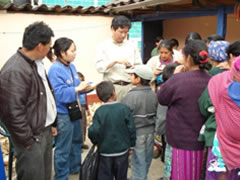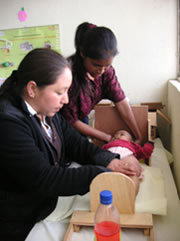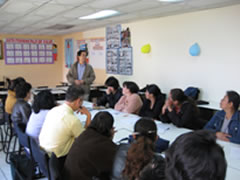- Home
- Countries & Regions
- Latin America
- Guatemala
- Activities in Guatemala
Activities in Guatemala
Children’s Health Project in Quetzaltenango
Background and Objective

The Children’s Health Project in Quetzaltenango aims to decrease “the infant mortality rate” in a sustainable manner in Quetzaltenango Department, a region of Guatemala which infant mortality rate is particularly high. This is being done through the education for healthcare workers, the improvement of their relation with the residents, the resident participatory peer leader trainings and others at some project sites within Quetzaltenango Department.
- Date of agreement: September 29, 2005
- Total amount: 207 million yen
- Executing agency: Department of Health of Quetzaltenango (Área de Salud de Quetzaltenango)
Project Summary

Steps such as organizing investigative committees are being taken to analyze the status quo of infant death cases at six sites within Quetzaltenango Department. Additional trainings are being provided in neighboring Mexico, a Spanish-speaking country where more advanced medical care is provided. To improve “Five Health Indexes” for Central and South American countries including Guatemala, which is one of targets in this project, Japan Overseas Cooperation Volunteers have been transferring technology to the counterpart organizations. The results of the analysis so far show that 80 percent of deceased infants did not visit a departmental health facility. Also, the death of three-month or younger infants occurred on the third day average since the symptoms were developed, which should be a very short period. Furthermore, 40 percent of the death was found to be underweight. The Children’s Health Project is taking a variety of measures against such factors to meet the project goal of decreasing the infant mortality rate.
Project Highlights

A central training center known as the Centro de Capacitación has been established in a hospital, where educational activities are provided to medical healthcare workers and young mothers grouped in the peer leader trainings. The next step is to focus on maternal nutrition issues which information is shared with the counterparts as a major factor of low-weight newborns. The project is proceeding by using educational materials such as notebooks to track the nutrition of mothers and their children.
- About JICA
- News & Features
- Countries & Regions
- Our Work
- Thematic Issues
- Types of Assistance
- Partnerships with Other Development Partners
- Climate Change / Environmental and Social Considerations
- Evaluations
- Compliance and Anti-corruption
- Science and Technology Cooperation on Global Issues
- Research
- JICA Development Studies Program / JICA Chair
- Support for the Acceptance of Foreign HRs / Multicultural and Inclusive Community
- Publications
- Investor Relations
